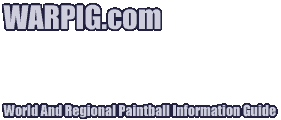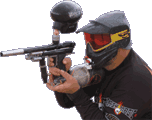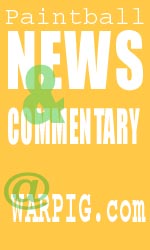  |
|
|
|
|
|
|
  |
|
|
|
|
|
|

What do you think? Add your comments in WARPIG's Tourney TALK Forum
|
by Bill Mills The Paintball Referee Organization is looking for refs for the NPPL and other paintball series. For years, a criticism of major paintball events has been that the tournaments are reffed by teams that play within the league. It is not unheard of for teams to claim that they got a "bad call" due to a team rivalry, or even threaten a referee with retribution at an event they are judging later if a call does not go their way. Additionally, without a formal training program, reffing tends to be inconsistent. Different teams or refs perform their function more or less strictly. There have been a number of attempts to address this issue in various leagues through North America. Early on the North American Paintball Referee's Association (NAPRA) developed a training program, and many promoters would look for NAPRA certification (which involved going through a training course) when hiring refs. NAPRA lost momentum and disbanded in the mid 1990s. The USPL listed in it's rules that it would only use referees that did not play within it's league. Paintball Technical Institute began a referee training program in the late 1990s, and in 2001, the WPF began using refs which were not allowed to compete within their league. The NPPL is the only circuit (there are some single events) in North America to have a pro division, and due to this is often looked upon as the top level of paintball competition in the world. Many of those involved in the league organization and planning have been long resistant to using anyone but teams within the league as referees. The reasons named have been cost, and more often cited, the heavy aggressive play in the league that is more difficult to judge than most amateur and novice events. Having teams within the league serve as judges has also been a point of criticism for the NPPL. 2002 marks the turning of a new page for the league as structural changes made during the 2001 season come to fruition. The NPPL began as a corporation owned by the teams within the league. The NPPL sanctioned their name, rules and game format to event promoters who produced the NPPL tournaments. As the teams became less involved, the corporation became weaker, and it was eventually dissolved for non-payment of taxes. The continuation of NPPL tournaments was carried on by the event promoters. During the 2001 season, many players dissatisfied with a lack of representation organized and moved for a rebuilding of the league. In the fall of 2001 the NPPL was incorporated once again, under the leadership of president Chuck Hendsch. For 2002, the NPPL is moving toward the use of trained, independent referees. This is being achieved through PRO, a division of the NPPL. Last Fall British tournament paintgun powerhouse WDP stepped up to bat by providing the initial seed money to help launch PRO, and additional support (though more is needed to achieve PRO's long-term goals) came from Paintball Sports Promotions, the company producing the NPPL tournament series.
The PRO plan of attack is to begin by training PRO referees. A handful are expected to ref at Skyball 2002. 20 PRO referees will officiate at the NPPL Los Angeles Open, side by side with refs from NPPL teams. PRO refs will be phased into the NPPL tournaments steadily over the season as the program is evaluated, and as more PRO refs become available. The goal is to have the World Cup 2002 judged entirely by PRO refs. In the long term, the PRO plans to go wider than the NPPL. Tournament promoters wishing to utilize PRO will be able to offer a set standard level of officiating at their events. Refs who have completed the PRO training will be eligible to ref as PRO judges only in leagues in which they do not compete. So who are the PRO refs? PRO is looking for people, hopefully with a background in paintball tournament reffing, or playing, though that is not required. They must go through PRO training which consists of half a day of seminar time, and half a day of judging pro teams during a practice session. PRO training sessions will be held at different times and locations throughout the US, and at present there are no plans to charge students in the course, as its purpose is not to generate profit for the trainers, but to form quality referees for tournament paintball. A number of the people joining PRO early are professional paintball players who have retired from playing the NPPL. Initially it is expected that PRO refs will be paid in the neighborhood of $65 to $100 per day of judging, with a portion of their expenses covered as well. Ultimately Cookston hopes that travel, hotel, and daytime food expenses will be included in the referee's compensation. Players or referees
interested in joining PRO are encouraged to contact Bill Cookston to find
out when a training session will be held in their area. The latest
information about PRO can be found at
www.paintballrefs.com
. |
| Copyright © 1992-2019
Corinthian Media Services. WARPIG's webmasters can be reached through our feedback form. All articles and images are copyrighted and may not be redistributed without the written permission of their original creators and Corinthian Media Services. The WARPIG paintball page is a collection of information and pointers to sources from around the internet and other locations. As such, Corinthian Media Services makes no claims to the trustworthiness or reliability of said information. The information contained in, and referenced by WARPIG, should not be used as a substitute for safety information from trained professionals in the paintball industry. |